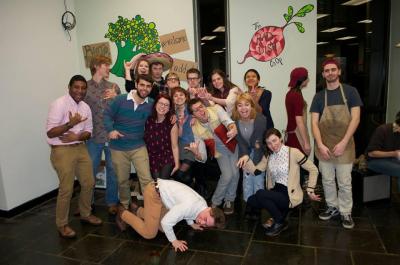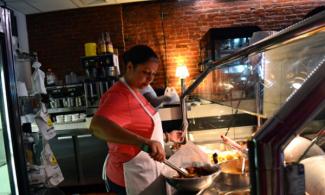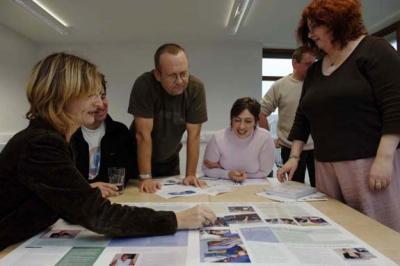Thinking about a next system with W.E.B. Du Bois and Fannie Lou Hamer
Before launching The Next System Project, we sat down with historian and economic activist Jessica Gordon Nembhard to learn what the tradition of Black cooperative economic development and the long struggle for civil rights could teach us about system change and system models. What follows is an edited transcript of that conversation.

 WASHINGTON (October 1, 2015) – National Farmers Union (NFU) President Roger Johnson today hailed the nation’s many and varied cooperatives, noting that they have brought both political and economic might to family farmers, ranchers and rural America for over a century.
WASHINGTON (October 1, 2015) – National Farmers Union (NFU) President Roger Johnson today hailed the nation’s many and varied cooperatives, noting that they have brought both political and economic might to family farmers, ranchers and rural America for over a century. Most meals on Temple University's main campus are served by a huge, multinational food-services company, Sodexo.
Most meals on Temple University's main campus are served by a huge, multinational food-services company, Sodexo.
 Originally, Skoros emerged as a response to an increasingly commercialized and consumerist (Athenian) society. It represented an experimentation with doing things differently: by gifting, sharing, and exchanging; and by foregrounding the values of communality, degrowth, solidarity and social justice.
Originally, Skoros emerged as a response to an increasingly commercialized and consumerist (Athenian) society. It represented an experimentation with doing things differently: by gifting, sharing, and exchanging; and by foregrounding the values of communality, degrowth, solidarity and social justice.

 Back in the day, factory workers at the Chicago-based Republic Windows and Doors were simply told what to do. That wasn’t unusual. Workers might have seen ways to improve the production process, but at Republic their supervisor wasn’t interested, said former employee Armando Robles.
Back in the day, factory workers at the Chicago-based Republic Windows and Doors were simply told what to do. That wasn’t unusual. Workers might have seen ways to improve the production process, but at Republic their supervisor wasn’t interested, said former employee Armando Robles. Co-ops and co-op members need to have higher expectations of professional behaviour from other co-operators. This is a movement where we have an obligation to create amazing workspaces filled with rich community, deep interdependence, synergy, collaboration, open communication and positive-sum thinking. It's often not.
Co-ops and co-op members need to have higher expectations of professional behaviour from other co-operators. This is a movement where we have an obligation to create amazing workspaces filled with rich community, deep interdependence, synergy, collaboration, open communication and positive-sum thinking. It's often not.
 It was a cooperative in Puerto Rico's Guayama prison that changed his life. Growing up, Roberto Luis Rodriguez Rosario was surrounded by violence, and lived most of his pre-teen years in foster homes. "By the time I was a teenager, I was filled with anger," he remembers. "I became a rebel, and lost my way in drugs and alcohol. I stopped going to school at 14, and began getting arrested at 15.
It was a cooperative in Puerto Rico's Guayama prison that changed his life. Growing up, Roberto Luis Rodriguez Rosario was surrounded by violence, and lived most of his pre-teen years in foster homes. "By the time I was a teenager, I was filled with anger," he remembers. "I became a rebel, and lost my way in drugs and alcohol. I stopped going to school at 14, and began getting arrested at 15.


 Mayor Bill de Blasio recently discovered, during his short-lived campaign against Uber, that saying no to a popular, convenient new technology doesn't tend to win many friends—or win much at all. In just a few years, New York City's regulated yellow-taxi fleet has been outnumbered by a distant company with uncertain intentions. There are benefits to this, as well as mounting costs. But critics like Mr.
Mayor Bill de Blasio recently discovered, during his short-lived campaign against Uber, that saying no to a popular, convenient new technology doesn't tend to win many friends—or win much at all. In just a few years, New York City's regulated yellow-taxi fleet has been outnumbered by a distant company with uncertain intentions. There are benefits to this, as well as mounting costs. But critics like Mr.